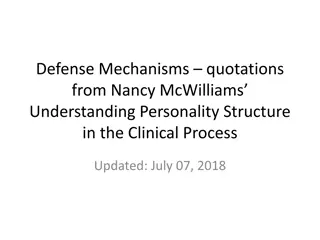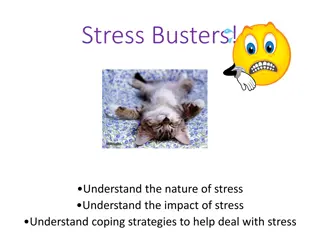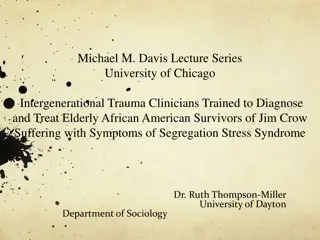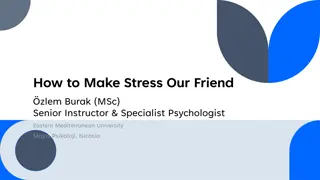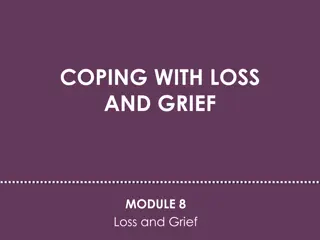Understanding Coping Skills and Defense Mechanisms
Coping mechanisms and defense mechanisms are strategies individuals use to manage stress and emotions. Coping mechanisms help people adjust to difficult events while maintaining emotional well-being, whereas defense mechanisms operate at an unconscious level and can change internal psychological states. Positive appraisal, problem-focused, emotion-focused, and meaning-focused coping are different types of coping strategies individuals may employ in various situations.
Download Presentation

Please find below an Image/Link to download the presentation.
The content on the website is provided AS IS for your information and personal use only. It may not be sold, licensed, or shared on other websites without obtaining consent from the author. Download presentation by click this link. If you encounter any issues during the download, it is possible that the publisher has removed the file from their server.
E N D
Presentation Transcript
Coping Skills and Defense Mechanisms AISHA SALEEM
Coping Skills Coping mechanisms are the strategies people often use in the face of stress and/or trauma to help manage painful or difficult emotions. Coping mechanisms can help people adjust to stressful events while helping them maintain their emotional well-being.
Coping Mechanisms WHAT ARE COPING MECHANISMS? Significant life events, whether positive or negative, can cause psychological stress. Difficult events, such as divorce, miscarriage, the death of a loved one, or the loss of a job, can cause most people to feel grief or distress. But even events that are considered positive by many getting married, having a child, and buying a home can lead to a significant amounts of stress. To adjust to this stress, people may utilize some combination of behavior, thought, and emotion, depending on the situation. People may use coping mechanisms for stress management or to cope with anger, loneliness, anxiety, or depression.
Coping Mechanisms and Defense Mechanisms HOW ARE COPING MECHANISMS AND DEFENSE MECHANISMS DIFFERENT? Some may confuse defense mechanisms with coping mechanisms. Although these two concepts share some similarities, they are, in fact, different. Defense mechanisms mostly occur at an unconscious level, and people are generally unaware they are using them. One s use of coping mechanisms, on the other hand, is typically conscious and purposeful. Coping mechanisms are used to manage an external situation that is creating problems for an individual. Defense mechanisms can change a person s internal psychological state.
Types of Coping Positive appraisal is the reframing a situation to see it in a positive light. Positive reappraisal has been significantly and independently associated with increases in positive affect. Problem-focused or approach coping happens when efforts are directed at solving or managing the problem that is causing distress. It includes strategies for gathering information, making decisions, planning, and resolving conflicts. This type of coping effort is usually directed at acquiring resources to help deal with the underlying problem and includes instrumental, situationspecific, and task- oriented actions.
Emotion-focused or avoidant coping is coping that is directed at managing or reducing emotional distress, which includes cognitive strategies such as looking on the bright side, or behavioral strategies such as seeking emotional support, having a drink, or using drugs. Meaning-focused coping involves searching for meaning in adversity and drawing on values, beliefs, and goals to modify the meaning given to and personal response to a stressful situation
Defense Mechanisms Defense mechanisms are psychological strategies that are unconsciously used to protect a person from anxiety arising from unacceptable thoughts or feelings.
Sigmund Freud (1894, 1896) noted a number of ego defenses which he refers to throughout his written works. His daughter Anna (1936) developed these ideas and elaborated on them, adding ten of her own. Many psychoanalysts have also added further types of ego defenses.
Why do we need Ego defenses? We use defense mechanisms to protect ourselves from feelings of anxiety or guilt, which arise because we feel threatened, or because our id or superego becomes too demanding. Defense mechanisms operate at an unconscious level and help ward off unpleasant feelings (i.e., anxiety) or make good things feel better for the individual.
Repression Repression is an unconscious defense mechanism employed by the ego to keep disturbing or threatening thoughts from becoming conscious. Thoughts that are often repressed are those that would result in feelings of guilt from the superego. This is not a very successful defense in the long term since it involves forcing disturbing wishes, ideas or memories into the unconscious, where, although hidden, they will create anxiety. Repressed memories may appear through subconscious means and in altered forms, such as dreams or slips of the tongue ('Freudian slips'). For example, in the oedipus complex, aggressive thoughts about the same sex parents are repressed and pushed down into the unconscious.
Projection Projection is a psychological defense mechanism proposed by Anna Freud in which an individual attributes unwanted thoughts, feelings and motives onto another person. What is an example of projection? Thoughts most commonly projected onto another are the ones that would cause guilt such as aggressive and sexual fantasies or thoughts. For instance, you might hate someone, but your superego tells you that such hatred is unacceptable. You can 'solve' the problem by believing that they hate you.
Displacement Displacement is the redirection of an impulse (usually aggression) onto a powerless substitute target. The target can be a person or an object that can serve as a symbolic substitute. Displacement occurs when the Id wants to do something of which the Super ego does not permit. The Ego thus finds some other way of releasing the psychic energy of the Id. Thus there is a transfer of energy from a repressed object-cathexis to a more acceptable object. What is an example of projection? Someone who feels uncomfortable with their sexual desire for a real person may substitute a fetish. Someone who is frustrated by his or her superiors may go home and kick the dog, beat up a family member, or engage in cross-burnings.
Sublimation Sublimation is similar to displacement, but takes place when we manage to displace our unacceptable emotions into behaviors which are constructive and socially acceptable, rather than destructive activities. Sublimation is one of Anna Freud's original defense mechanisms. Many great artists and musicians have had unhappy lives and have used the medium of art of music to express themselves. Sport is another example of putting our emotions (e.g., aggression) into something constructive. For example, fixation at the oral stage of development may later lead to seeking oral pleasure as an adult through sucking one's thumb, pen or cigarette. Also, fixation during the anal stage may cause a person to sublimate their desire to handle faeces with an enjoyment of pottery. Sublimation for Freud was the cornerstone of civilized life, as arts and science are all sublimated sexuality. (NB. this is a value-laden concept, based on the aspirations of a European society at the end of the 1800 century).
Denial Denial is a defense mechanism proposed by Anna Freud which involves a refusal to accept reality, thus blocking external events from awareness. If a situation is just too much to handle, the person may respond by refusing to perceive it or by denying that it exist. As you might imagine, this is a primitive and dangerous defense - no one disregards reality and gets away with it for long! It can operate by itself or, more commonly, in combination with other, more subtle mechanisms that support it. What is an example of denial? Many people use denial in their everyday lives to avoid dealing with painful feelings or areas of their life they don t wish to admit. For example, a husband may refuse to recognise obvious signs of his wife s infidelity. A student may refuse to recognise their obvious lack of preparedness for an exam!
Regression Regression is a defense mechanism proposed by Anna Freud whereby the the ego reverts to an earlier stage of development usually in response to stressful situations. Regression functions as form of retreat, enabling a person to psychologically go back in time to a period when the person felt safer. What is an example of regression? When we are troubled or frightened, our behaviors often become more childish or primitive. A child may begin to suck their thumb again or wet the bed when they need to spend some time in the hospital. Teenagers may giggle uncontrollably when introduced into a social situation involving the opposite sex.
Rationalization Rationalization is a defense mechanism proposed by Anna Freud involving a cognitive distortion of "the facts" to make an event or an impulse less threatening. We do it often enough on a fairly conscious level when we provide ourselves with excuses. But for many people, with sensitive egos, making excuses comes so easy that they never are truly aware of it. In other words, many of us are quite prepared to believe our lies. What is an example of rationalization? When a person finds a situation difficult to accept, they will make up a logical reason why it has happened. For example, a person may explain a natural disaster as 'God's will'.
Reaction Formation Reaction formation is a psychological defense mechanism in which a person goes beyond denial and behaves in the opposite way to which he or she thinks or feels. Conscious behaviors are adopted to overcompensate for the anxiety a person feels regarding their socially unacceptable unconscious thoughts or emotions. Usually, a reaction formation is marked by exaggerated behavior, such as showiness and compulsiveness. By using the reaction formation, the id is satisfied while keeping the ego in ignorance of the true motives. Therapists often observe reaction formation in patients who claim to strongly believe in something and become angry at everyone who disagrees. What is an example of reaction formation? Freud claimed that men who are prejudice against homosexuals are making a defense against their own homosexual feelings by adopting a harsh anti- homosexual attitude which helps convince them of their heterosexuality. Another example of reaction formation includes the dutiful daughter who loves her mother is reacting to her Oedipus hatred of her mother.




